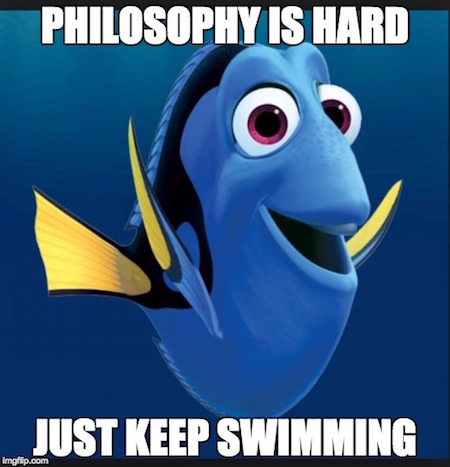How to Succeed in Philosophy Class
Philosophy is about making and understanding arguments.
Philosophy is not about yelling, but arguing – that is, rationally justifying your positions and debunking falsehoods.
Philosophy is not, primarily, about memorizing historical figures, philosophical schools, and terminology. You only learn memorize those things in order to be able to understand the arguments. Then you have to think.
Good philosophy classes employ project-based learning. We learn by doing. Philosophy is better caught than taught.

The only obstacle to project-based learning is this: Thinking is hard. Every philosophy student hits the wall. If you can get over the hump, then you will enjoy your class and it may have a good effect on your life. The wall is the moment where you feel frustrated, confused. You feel like something is wrong. You are mad at your classmate, your professor, or yourself. You think maybe philosophy just isn’t for you. Everyone who really reaps the rewards of doing philosophy has hit this wall and pushed through.
So don’t worry if you feel uncomfortable or incompetent. Just like weight lifting or long-distance running, no one starts out good at it. You just start. You may feel weak, slow, “dumb”, or confused. That’s normal.
What do we DO?
Just about every philosophy class will consist of:
- (A) reading classic texts or modern articles that make philosophical arguments
- (B) listening to your professor lecture,
- (C) asking questions of the teacher or discussing with each other, and
- (D) writing arguments in philosophical papers.
So, to succeed, you need to learn how to do each of these activities. The more you put in, the more you get out.
To have a great experience in a philosophy class, you must work hard. You must work to read, understand, discuss, and write about the topics and texts.
Here are some tips on each of these activities.
Reading tips
How do I get better at reading? Click the link above.
Lectures
How do I Get Better at Understanding these Lectures?
- Stop the professor often with questions. Philosophy is all about dialogue.
- Write down new vocab words and look them up before the next class.
- Talk with fellow students after class. Maybe you were both confused about the same thing; or maybe they can help.
- Be patient with yourself.
Discussion
How Do I Get Better at Discussion?
- Learn to make valid arguments.
- Read the Participation Instructions
- Practice, practice, practice!
- Follow the “Ground Rules”: 1. Say what you think. 2. Listen to your neighbor. 3. Ask your question. 4. Truth hurts; be kind. 5. Proving your neighbor wrong is loving; argue with each other. 6. Proving yourself wrong is wise; seek out your own mistakes. 7. Don’t compare yourself to others. 8. Silence is OK, too. 9. Follow the argument wherever it goes; trust the process.
- Read “How to Lead a Discussion”: my featured eHow article (viewed almost +300,000 times)
- Read How to think aloud
Papers
How Do I Get Better at Writing Philosophy Papers?
- Learn to argue well.
- Writing a paper is an exercising in clear thinking. You must think first, write second.
- For my classes, the disputation format works well. Disputations prove a thesis. The thesis answers a question. Disputations respectfully summarize your opponent’s viewpoint. Disputations state a thesis, provide goood arguments, state reasonable objections, and refute them. Disputations are not papers, since they don’t have an introduction or conclusion. Disputations are the outline or “skeleton” of a paper, with clear, numbered, sections.
- In general, philosophy papers can be structured like this. Philosophy papers advance a thesis. Like a disputation, they are clear, rigorous, and address objections or counter-arguments. Unlike a disputation, however, they have an introduction, a conclusion, and no section flags.
Grammar and Usage Tips (modified from Strunk and White)
- Omit needless words. The most important feature of clear writing is that there are no extraneous words muddling up your thoughts. Ask yourself, “What exactly am I trying to say?” and then say it, as concisely as possible.
- Use complete sentences. Do not break sentences into two (not “I met Holmes years ago. Coming home from Liverpool.”)
- Participle phrases at the beginning of sentences refer to grammatical subject. (not “Shaken, the car almost missed him.”)
- Stay consistent in singular or plural (not “A person is happy if their dog is happy.”)
- In summaries, keep to one tense (not “He went first to Asia Minor, before he goes to Africa.”)
- Use active voice (not “The bystander was hit by the boxer.”)
- Does not join independent clauses by a comma (not “My friend is a champion, we met after the Olympics.”)
- Makes sure the reader knows who’s speaking (not Love is a divine attribute. “God is love.”)
- Be clear.
- Use definite, specific language
- First and last paragraphs should engage reader attention
- Avoid the thesaurus and fancy words (“zeitgest”, “ouevre”, “uber-smart”) — if you haven’t earned it, don’t use it.
- Do not construct awkward adverbs (not “unfeelingly” but “without feeling”)
- Use orthodox spelling (not “humour,” “Alright”, “tonite” but “humor” “all right” “tonight”)
- Express co-ordinate ideas in similar form
- Keep related words together
- Place emphatic words of sentence at the end
- Avoid succession of loose sentences
- Write in a way that comes naturally
- Do not affect a breezy manner
- Be very clear.
Topics
I’m Interested in Learning More about a Particular Philosopher or Topic; Where Should I Start?
- Read the Internet Encyclopedia of Philosophy article for medium difficulty introductions to any topic, thinker, or school of thought. Much better than just googling it!
- If you want a more rigorous version of the same, read the Stanford Encyclopedia of Philosophy.

